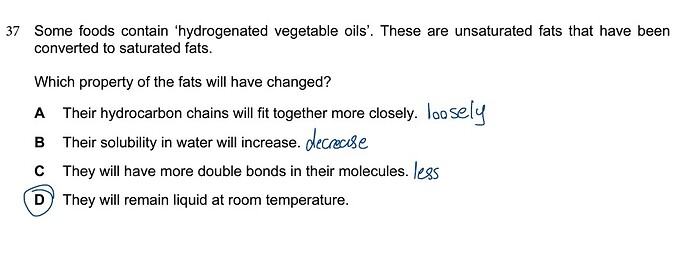Yes, option D is correct. Fats do become solid once saturated, only liquify at higher temperatures.
A - is correct, as hydrogenation removes the “kinks” in the fatty acid, therefore causing it to be linear and with more surface area that allows them to pack more closely
B - The solubility in water won’t really be affected, changing the length will have a minor effect on the solubility, but remember fats aren’t soluble in water and C-H bonds aren’t polar (the difference is 2.1 to 2.5 in the electronegativity index if I remember correctly, so 0.4 is still non-polar)
C - They will indeed have less double bonds in their molecule, as they lose the double bond to the H that joins the carbon during hydrogenation
D - Butter for example is mostly saturated fat, it will remain solid and not liquid at room temperature. Unlike Canola oil for example which is mostly unsaturated fats, it remains liquid in room temperature.
Therefore I believe the answer is A.
@dorsa_vaezi Do you mind editing your questions and adding the exam and the year of that exam you are sourcing your questions from? Thank you
@hotlinebling I agree with you…
That’s why i asked the question. The saturated fats won’t remain liquid at room tempreture… so all of these options are wrong…non of them is the answer
@AriHoresh thank you so much!
Yes A is the answer. Removing kinks won’t cause fats to get more loosely? I can’t understand this part…
